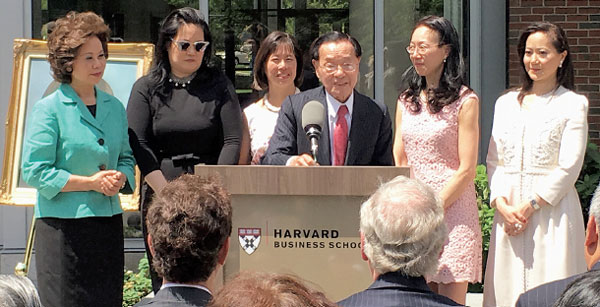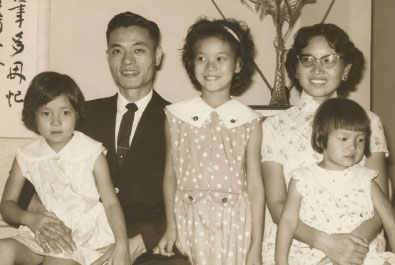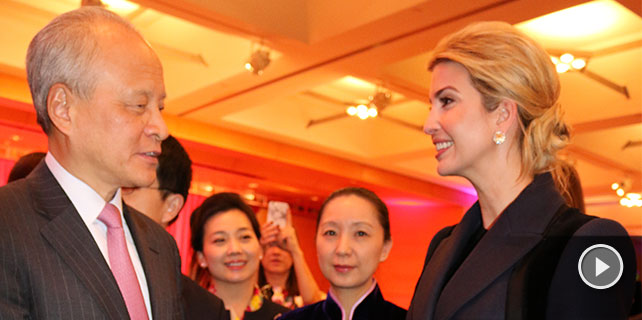The Chao Family:One of a kind
The family of James S.C. Chao is likely the most well-known Chinese immigrant family in the United States, and the shipping magnate says that raising"wonderful daughters"has been his greatest triumph, Larry Lee reports from New York.
The man for whom it probably could be said has everything doesn't have a membership of the Harvard Club on West 44th Street in Midtown Manhattan near the international shipping, trade and finance company he founded in 1964.
Only alumni and faculty of Harvard University are pre-qualified to apply for membership. But James S.C. Chao's Harvard connection is a long and deep one.
"Four of my daughters and two sons-in-law are members," said Chao proudly of the four of his six daughters who graduated from Harvard Business School.
The Chao family has donated more than $40 million dollars to Harvard, where the executive education building was named after, in Harvard's words, the matriarch of "this most prominent and accomplished Chinese-American family", the late Ruth Mulan Chu Chao.
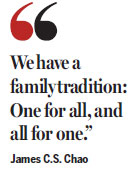
Waiters know him
Chao is a familiar presence to waiters at the Harvard Club. He has his designated table in a relatively quiet corner where he can talk with guests.
He was my guest for lunch there on Jan 13, one day after he returned to New York from attending the Senate confirmation hearing for his eldest daughter, Elaine L. Chao, as secretary of Transportation. With her swearing in on Tuesday, she became the first female Asian American to serve in two US presidents' cabinets, a feat few Americans, male or female, can match.
For her 90-year-old father, it was not easy to travel from the Big Apple to the nation's capital and sit in the hearing for almost four hours. "We have a family tradition: One for all, and all for one," said Chao.
Some 20 years ago, I was Chao's luncheon guest at the Harvard Club, the recipient of an invitation spurred by his learning about the story I had written about his eldest daughter Elaine when I was Washington bureau chief for a Hong Kong newspaper.
Then, Elaine Chao was a distinguished fellow at a Washington think tank. In the lengthy interview she gave me,she expressed her views about many issues, including some sensitive ones in the Asian community, such as affirmative action. She didn't hide her objection to affirmative action, pointing out that quotas and goals harm Asian Americans and America, saying that in the land of opportunity success should be based on merit.
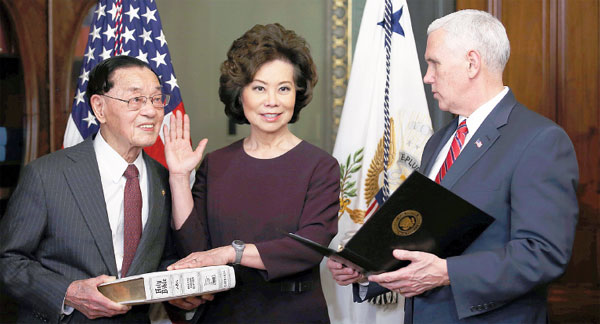
That luncheon in 1998 was the first time I had met her father, and my first time at the club. We had a very pleasant conversation; he asked about my age, my experience as a journalist and my future writing plans.
All I knew about Chao then was that he was quite successful in the shipping industry, and that he had six very talented, well-educated daughters who were on outstanding career paths.
Biography published
But this time, the night before our lunch, I had stayed up to 3 am to read a copy of Fearless Against the Wind, the Chinese version of Chao's biography. I hope someone can translate this biography into English so that more people in the US can know about Chao's great family history.
|
Top: New Transportation secretary Elaine Chao is sworn in by US Vice-President Mike Pence as her father, James S.C. Chao, holds a bible during the ceremony at the White House on Tuesday. Carlos Barria / Euters Above: Chao and his daughters - (from left) Elaine, Grace, Christine, May and Angela - at the dedication ceremony of the Ruth Mulan Chu Chao Center at Harvard Business School in June 2016. Larry Lee / China Daily |
Right after his biography was published in Taiwan in November 2016, I had the luck of obtaining a copy from Chiling Tong, a longtime friend of the Chao family, and the founding president of the International Leadership Foundation. She used to be the associate director of the Minority Business Development Agency in the US Commerce Department.
I had the honor of attending Tong's wedding in Taipei in 1996. Her husband, Joel Szabat, is deputy assistant-secretary of Transportation and executive director of the Maritime Administration.
John Tsu, the late chairman of the Asian Republican National Committee, introduced Tong to me more than 20 years ago.
Tsu was President George H. W. Bush's Chinese tutor and a close friend. He was a member of the White House transition team when Bush was elected the 41st US president in 1988. He had played an essential role in recommending qualified Asian-American candidates to the Bush administration.
Tsu had also encouraged many young and talented Asian Americans to enter politics. He was mentor for Tong and many others.
|
The Chao family reunion in New York in 1961, when Elaine Chao was 8 years old. Provided To China Daily |
Publication of the 434-page book in Taiwan coincided with Elaine Chao's nomination as Transportation secretary and so the book had aroused a lot of attention among the Chinese community and Chinese media in the US.
At our lunch we talked about his biography,the cabinet nomination of his daughter, and what has been the formula, if there is one, for Chao to have such successful and devoted daughters and a successful career as an ocean shipping tycoon.
He is chairman of The Foremost Group, headquartered in New York and with branch offices all over the world. The company's bulk fleet totals approximately 4 million deadweight tons, with an average age of less than five years.
On his success, he spoke simply: "If you can't change your environment, change yourself."
And on the success of daughters, Elaine, May, Christine, Grace and Angela, (his second daughter, Jeanette, passed away in 2008), "Thank God I had such a good wife. Without her, nothing would have happened."
Chao clearly recalled details of what we had talked about in 1998.
"You wrote many editorials, right?" Doing so was a regular part of my job back then. And Chao recalled his early years: "As a student at Shanghai Jiaotong University in the 1940s, I was the publisher of a student newspaper, Youth. I was in the limelight at that time, dreaming to be a journalist in the future."
The bi-weekly newspaper with a circulation of more than 2,000 was distributed to eight public and three private universities in Shanghai. At the time, it was the final phase of China's civil war, and dangerous for a student newspaper to cover sensitive political issues. Youth ceased to publish after five issues. So ended Chao's dream of being a journalist.
"An idealist"
"I have always been an idealist. At that time, I had been determined to contribute to my country by studying science and engineering," he said.
Chao mentioned Qin Fen (1882-1973), a distant relative of his father and a Harvard-trained mathematician. "Qin Fen had a big impact on me. If you want to do something big, you've got to be well educated," he said.
A waiter brought Chao a glass of Baileys Irish Cream, an Irish whiskey and cream-based liqueur. "Actually, I just ordered this once, they remembered, and offer this to me every time I am here," he said.
Instead of tea, he asked for a glass of hot water. For people of his generation, most Chinese would develop the habit of drinking tea, and they can name different kinds of tea and be able to distinguish the taste and quality differences. Chao can't.
"I am OK to drink any kind of tea, or no tea. I don't drink alcohol. When I was a young seaman, I did drink liquor," he said.
Though not a picky person, Chao mentioned how much he likes the Japanese food at the Harvard Club.
"It's a big deal to eat good sashimi anywhere in the world. You need to keep the fresh raw fish filet in the refrigerator at zero degree Celsius for 60 hours to kill all the bacteria and parasites and also keep the best flavor of it. The chefs here can do this,"he said.
David Haviland, the club's executive chef, confirmed Chao's comment. Freezing raw fish before serving has been a New York City regulation since August 2015.
Haviland also told me that the Japanese food chef at the club was trained by Masaharu Morimoto, the world-famous sushi master who used to be the head chef of Nobu restaurant in New York and executive chef of Sony Club.
Chao, who was born in a small village in Jiading county, now part of Shanghai, said he also enjoys Shanghai cuisine, with its sweet taste in almost all dishes. He singled out eel paste, stir-fry eel with sugar, white pepper and many seasonings, a typical and tasty Shanghai dish.
Only chicken
However, as a poor immigrant coming to the US in 1958, he had to give up his hometown's delicious food, and chicken became his major dish. "A whole chicken was 29 cents. I boiled it. Making use of one chicken, I could prepare three meals for me. Besides eating the chicken, I got a pot of chicken broth," he said.
While in America, Chao was separated from his family for three years. His wife joined him from Taiwan with their three daughters, Elaine, Jeanette and May, after a 37-day voyage across the Pacific.
Chao's father, Yiren Chao, was the principal of a primary school in his hometown, Jiading. Then it was common for Chinese families to build big houses as long as they had money. However, Chao's father refused to do so. He spent almost all his money on his only child's education. Chao's house in Jiading was really shabby, and it was demolished with the construction of the Shanghai Formula 1 Track in 2005. The memory of the house remains with Chao.
"Without my father's decision not to build a big house, I wouldn't be able to have my education, and my life would be totally different," he explained.
Chao still goes to his Manhattan office every day. He has held the title of chairman of Foremost since its founding. Angela, the youngest of the sisters and also a Harvard Business School graduate, is deputy chairwoman. Her father is very happy to see her gradually taking over the company.
On the day we met at the Harvard Club, Angela was in Japan to attend the handover and launching ceremony for a 180,000 deadweight ton bulk cargo ship built for Foremost, and after that she was going to Qingdao, China, for the launching ceremony of another ship for Foremost. "Three additional cargo ships are under construction now," said Chao.
Chao's wife, Ruth Mulan Chu Chao, died on August 2, 2007. They had been married for 56 years.
A country boy
"I came from a poor family and her family was very rich," he said. "I was a country boy who was very active and energetic, such as using a camera and developing photos myself."
On June 6, 2016, all members of the Chao family were at the dedication ceremony of the Ruth Mulan Chu Chao center at the Harvard Business School. Elaine Chao's husband, Senate Majority Leader Mitch McConnell, was also there.
Chao asked for a cup of coffee after our lunch. No sugar. He was relaxed, gentle and graceful. I said that I believed he has nothing to worry about at this stage of his life.
"If a man has nothing to worry about, that would be boring," Chao answered. "That means you are old, and you would have nothing to do with this world. My principle is, at young age, you should associate more with senior people, and you would benefit from their knowledge and experiences. At my age, I like to associate with young people. Doing so will keep you active and vigorous."
Today, wealth is often used as a main indicator of success, but for Chao his daughters reflect a far more brilliant and longer-lasting success that he has achieved. And most people would agree that the core of the successful story of the Chao family is the daughters.
"They possess traditional filial piety," said Chao. "Elaine always call me every night before I go to bed. If she can't do it due to traveling or some other reason, she sends an email to me."
On the eve of the inauguration of Donald Trump, Chao traveled to Washington again. He hosted a dinner for some old friends, including alumni of Shanghai Jiaotong University, his alma mater. Elaine and her husband attended, of whom she said, "I have been very blessed to have a wonderful supportive husband. He cooks. He does his own laundry."
Holding her father's hand, Elaine said emotionally: "Not many people have fathers or parents who are able to see them in whatever they do. My mother left on August 2, 2007. I am extraordinarily grateful that my father is able to be here and see so much of what his children have been able to accomplish."
Visiting Ferncliff
Now, every Saturday, Chao goes to Ferncliff Cemetery in Hartsdale, New York, about 25 miles north of Midtown Manhattan, where he pays respect to his wife. Soong Mei-ling, Chiang Kai-Shek's wife, is also buried there. Chao prepares a cup of tea for her. The same thing he loved to do when she was alive.
"Winning her heart was the greatest achievement of my whole life," he said.
Larry Lee is vice-chairman of China Daily Holding Co Ltd.He can be contacted at larrylee@chinadailyusa.com.
(China Daily USA 02/03/2017 page20)



